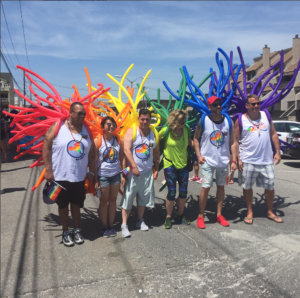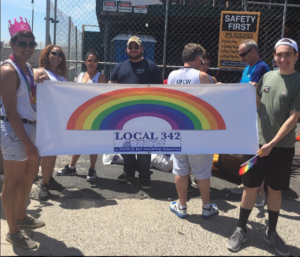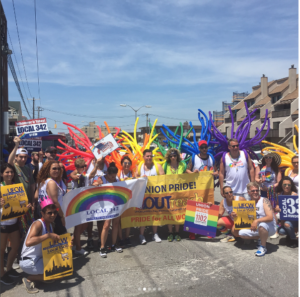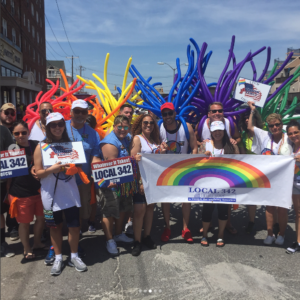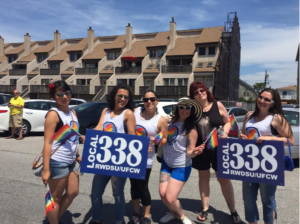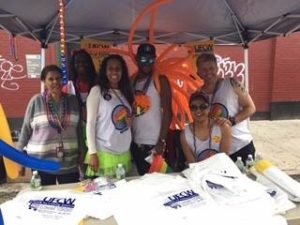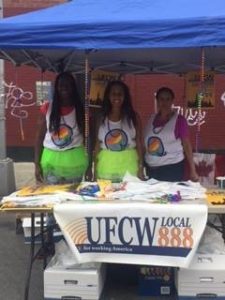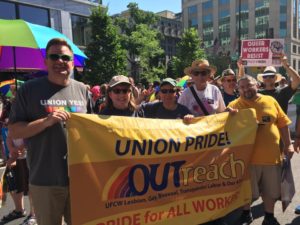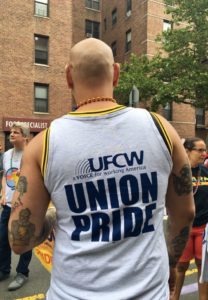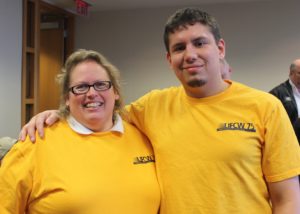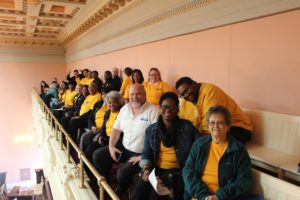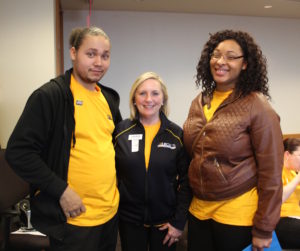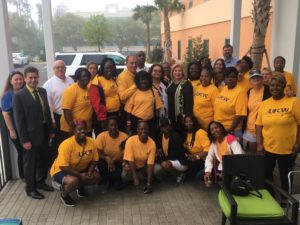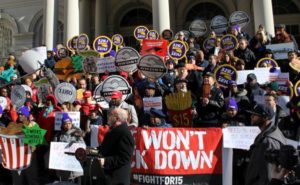September 5, 2017
UFCW Condemns White House Decision to End DACA
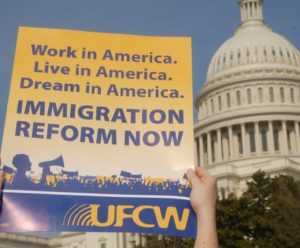 On Sept. 5, UFCW International President Marc Perrone issued a statement regarding the Trump Administration’s termination of Deferred Action for Childhood Arrivals (DACA), a program protecting hundreds of thousands of young immigrants who were brought into the country illegally as children.
On Sept. 5, UFCW International President Marc Perrone issued a statement regarding the Trump Administration’s termination of Deferred Action for Childhood Arrivals (DACA), a program protecting hundreds of thousands of young immigrants who were brought into the country illegally as children.
The statement reads as follows:
“President Trump’s decision to end DACA is cold-hearted, cruel, and a betrayal of what America stands for.
“Hundreds of thousands of young, hard-working men and women who love America will now be needlessly punished for childhood circumstances. These young people have grown up in this country, passed background checks, pay taxes, go to school, and have worked hard to build a better America. They have earned and deserve fair treatment, but instead their lives are being thrown into chaos with this announcement.
“President Trump’s decision will not make America great again; rather, it will tear families apart, damage communities, and further fuel a terrible divide that is already hurting the nation we all love.
“On behalf of the 1.3 million members of our union family, we urge all Members of Congress to immediately do what is right and protect these Dreamers.”
On Sept. 6, the UFCW distributed a memo to UFCW Locals regarding the status of DACA.
The memo reads as follows:
TO: ALL UNITED FOOD AND COMMERCIAL WORKERS LOCAL UNIONS
As many of you know, on September 5, 2017, the U.S. Department of Homeland Security (DHS) announced a phased ending to Deferred Action for Childhood Arrivals (DACA) program.
The following outlines important details and information for our locals to discuss with affected members.
What will end immediately?
No new DACA applications will be accepted as of September 5, 2017.
No new applications for employment authorization will be accepted after September 5, 2017.
There will be no approval of advance parole, which allows temporary leave from the U.S. and lawful reentry into U.S., for DACA recipients as of September 5, 2017.
What about DACA will continue to be processed?
Initial DACA applications and employment authorization requests that are already filed as of September 5, 2017 will be processed.
Applications for renewal of DACA and work authorization for current beneficiaries whose status expire between September 5, 2017 and March 5, 2018 will be processed if they are received by DHS within the next 30 days by October 5, 2017. If granted, the recipient will remain in status for the validity period which typically has been two years.
Applications for DACA renewal and work authorization filed after October 5, 2017 shall be rejected.
What is the status of current DACA recipients?
Current DACA recipients and Employment Authorization Document holders will continue in the DACA status with work authorization for the duration of the two-year validity periods.
DACA recipients with currently approved advance parole will be allowed to temporarily leave for the validity period granted. However, Customs and Border Protection (CBP) still retains discretion to deny reentry at the border.
What is the current status of enforcement when DACA expires?
DACA information provided to U.S. Citizenship and Immigration Services (USCIS) to process DACA applications will not be proactively shared with Immigration and Customs Enforcement (ICE) or CBP.
For more information, contact the UFCW Legal Department at (202) 466-1593 or rbowser@ufcw.org.
June 15, 2017
UFCW Locals Stand with LGBTQ Workers During Pride Month
Many UFCW Locals across the US and Canada are marching this June as part of LGBT Pride Month. Working in partnership with UFCW OUTreach, UFCW Locals are committed to leveling the playing field in our contracts and our laws.
2017 UFCW Pride Photos
Why March?
On June 28, 1969, members of the Lesbian, Gay, Bisexual, and Transgender (LGBT) community fought back against police brutality at a New York City gay bar called the Stonewall Inn. Known as the Stonewall riots, many consider this to be the beginning of the modern day LGBT rights movement.
In commemoration of the historic Stonewall riots, June is now commonly recognized as LGBT Pride Month. Keep an eye out throughout the month for UFCW locals who will be holding events to stand with hardworking men and women everywhere who deserve respect and equal protection both on and off the job, regardless of gender or sexual orientation.
May 26, 2017
Civil Rights and Labor: Two Movements, One Goal
by Richard Womack Sr. ,James Settles Jr.,Robin Williams
Originally published on the AFL-CIO blog
One of our most celebrated labor leaders, A. Philip Randolph, an organizer of the 1963 March on Washington, knew the connection between the labor movement and the civil rights movement was key to a truly inclusive democracy. He stood for access at the ballot box as well as to economic security—ideally through a good job with decent benefits and a union. Today, we find ourselves back in a place where our civil, economic, political and social rights are under constant attack. The violence we see against black youth—the heart-wrenching killing of Trayvon Martin, the homicide of Jordan Davis–the passage of “right to work” laws in states like Michigan, Missouri and Iowa that have deeply racist and divisive roots, and the constant attack on immigrant communities by the current administration affirm we still have work to do.
As trade unionists, labor leaders, parents and civil rights activists, we have dedicated our time, talent and resources to advancing the agenda for people who are simply working for a better life. We believe there has never been a more critical point in our nation’s history when it is so crucial for us to reconnect deeply the movement for working people with the movement for civil and human rights. We cannot forget that the March on Washington was about freedom, economic equity and good jobs. The intersection of human rights, civil rights and workers’ rights has always been a part of our struggles for independent power both here and abroad. We must continue to uplift those movements in an intersectional way to ensure we are able to win justice at the workplace and the ballot box to make a difference for those we serve.
This summer, one of the oldest and largest civil and human rights organizations, the NAACP, will come to the city of Baltimore for its annual convention. The NAACP has stood as a coalition partner to the labor movement since 1909. There are many organizations we as a movement value and partner with through shared program and the NAACP remains one of those core allies, despite the shifts that happen in the world around us. We have great leadership within both the labor movement and the NAACP. We have seen how powerful it is when leaders like AFT’s Lorretta Johnson stand shoulder to shoulder with the Rev. William Barber, leader of the NAACP North Carolina State Conference. We know our journey together must continue as we fight to assure that “the humblest and weakest person can enjoy the highest civil, economic and social rights that the biggest and most powerful possess.”
We must expand our vision by creating solidarity without borders so that working people will be treated with the respect we are due. Thus our history and our very purpose demand that we be in the forefront of the struggle to assure first-class citizenship to all people, of all colors, and all creeds without regard to sex, sexual orientation or gender identity. Our struggles are one; our hopes are one; our dreams are one. The past is not dead, it’s not even past.
To participate in the 2017 NAACP Labor Luncheon in Baltimore, please click here: cvent.com/d/n5q3qx
James Settles Jr., also known as Jimmy, serves as a vice president and member of the Executive Board at the UAW. He is a national board member and Labor Committee vice-chair of the NAACP.
Robin Williams serves as the national vice president of the United Food and Commercial Workers (UFCW). She is a national board member and Labor Committee vice-chair of the NAACP.
Richard Womack Sr. is the emeritus assistant to the AFL-CIO president and former director of the AFL-CIO Civil, Human and Women’s Rights Department. He is a national board member and Labor Committee chair of the NAACP.
April 28, 2017
UFCW President Perrone makes case for higher workplace safety standards
Safety is a right, not a privilege
In recognition of Workers Memorial Day, a day of remembrance of those who have lost their lives on the job, UFCW International President Marc spoke out about the need for workplace safety for everyone, regardless of where they work:
While we may debate many issues in this country, and our partisan divisions may be greater than ever, we must all agree that being safe and healthy at work should be a right, not a privilege.
Whether you work in a nursing home, on a construction site, in a retail store or a food processing plant, no hard-working man or woman should have to worry about being killed or injured in the workplace.
Headed down the wrong path
Perrone went on to express concern about the path the country is headed down when it comes to workplace safety:
Last month, President Trump signed a bill that eliminated the Fair Pay and Safe Workplaces rule, which required federal contractors to report and correct major safety and other labor violations. The Trump administration also plans to shrink federal funding for the Occupational Safety and Health Administration (OSHA), which would only make certain occupations and workplaces even more dangerous.
In fact, OSHA is already delaying enforcement of the crystalline silica standard that applies to the construction industry, and reversed an OSHA rule that clarified an employer’s responsibility to maintain accurate records of serious work-related injuries and illnesses. Even these specific changes will make it difficult for OSHA to compile injury and illness records that are critical to identifying what jobs are dangerous, and which employers are failing to keep their workers safe.
Bad for business
The piece also points out how unsafe workplaces are not only bad for the people who work in them, but they’re bad for the businesses themselves:
While some will suggest that these are unnecessary regulations and a fiscal burden to businesses, the truth is that eliminating workplace safety measures is not only bad for workers, it’s also bad for businesses.
Unsafe workplaces cost companies money.
Insurance claims increase with increasing worker injuries. Employee absenteeism rises in unsafe and unhealthy workplaces. In fact, workers took an average of eight days to recuperate from workplace illnesses and injuries in 2015. Unsafe workplaces result in higher worker turnover and low employee morale. And, in today’s social media driven world, the reputation and brand impact from an unsafe workplace or a needless injury or death are significant.
Workers Memorial Day is an international day of remembrance every April 28th that calls attention to preventable workplace deaths, diseases, and injuries around the globe. You can read the full piece by UFCW International President Marc Perrone on The Hill.
April 10, 2017
Local 400 Member Wins National Nursing Award
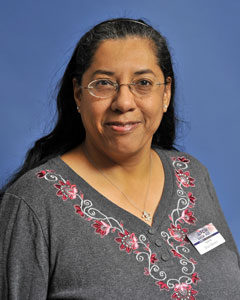 Isolina “Izzy” Pistolessi, a member of UFCW Local 400 who works as a nurse at Kaiser Permanente’s Falls Church Care Center in Falls Church, Va., has been chosen to be the recipient of Kaiser Permanente’s National Extraordinary Nurse Award.
Isolina “Izzy” Pistolessi, a member of UFCW Local 400 who works as a nurse at Kaiser Permanente’s Falls Church Care Center in Falls Church, Va., has been chosen to be the recipient of Kaiser Permanente’s National Extraordinary Nurse Award.
Pistolessi has worked at the Falls Church Care Center for 18 years, and is the second nurse from Kaiser Permanente’s Mid-Atlantic Region to receive this recognition. She will be flown to California in May to accept her award.
At the Falls Church Care Center, Pistolessi is a mentor to other nurses, conducts outreach to the community, promotes public health, educates and cares for patients, and serves as a UFCW Local 400 shop steward. Off the job, she is a volunteer and leader with the National Association of Hispanic Nurses, a member of the Fairfax Country Medical Reserve Corps, and a union activist who recently participated in UFCW Local 400’s Lobby Day.
“I’m very fortunate to work for Kaiser Permanente and do the work that I love to do—caring for patients and nurturing other nurses so they become better,” Pistolessi said. “And I’m proud to serve my coworkers as a shop steward. To receive this honor is a complete surprise—but it’s also wonderful.”
April 3, 2017
Ohio Locals Lobby to Stop “Work for Less” Legislation
More than 70 members from UFCW Locals 75 and 1059 went to Columbus, Ohio, on March 29 to speak with state legislators about the harmful effects of “work for less” laws.
A “work for less” bill was introduced in Ohio in February of this year, but so far it hasn’t gained any traction and legislative leaders in both parties have openly questioned the need for it. UFCW members like Bill Finnegan, who works at Campbell’s Soup in Napoleon, Ohio, are a big reason why “work for less” legislation hasn’t had enough support to pass.
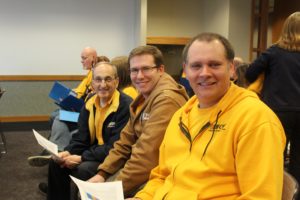 “This is my second lobby day and I chose to come here today to speak with my representatives and senators about the issues that impact the lives of my family and friends,” said Finnegan. “The top concern on that list right now is ‘work for less’ legislation because it would weaken the power and voice of workers all across Ohio.”
“This is my second lobby day and I chose to come here today to speak with my representatives and senators about the issues that impact the lives of my family and friends,” said Finnegan. “The top concern on that list right now is ‘work for less’ legislation because it would weaken the power and voice of workers all across Ohio.”
In meetings throughout the day with state legislators, UFCW members explained how “work for less” legislation directly threatens every hard-working family, whether they’re part of a union or not. Multiple representatives and senators remarked afterwards that hearing personal stories from people about why they’re so concerned about “work for less” legislation was much more effective than simply showing them the usual facts and graphs.
After the last meeting wrapped up, Finnegan talked about why he enjoyed participating in lobby days and other similar events.
“Getting to do stuff like this and meeting other members of our union are why I really enjoy being a part of UFCW,” he said. “Oftentimes after we hold events like this people will come up to me at work and ask how they can be a steward or become even more involved. Days like today make us realize that we have numbers and with that comes power.”
April 3, 2017
Local 1625 Works to Protect Patients and Quality Health Care in Florida
On March 28, UFCW Local 1625 held a lobby day in Tallahassee, Fla., with members who work in hospitals and nursing homes as nurses and nursing assistants. The day gave UFCW Local 1625 members the opportunity to speak with state legislators about SB 676 and HB 7, harmful bills in both chambers that would eliminate Florida’s Certificate of Need (CON) program. The CON program requires health care facilities to have state approval before offering new or expanded services. This process ensures all communities have equal access to hospitals, nursing homes, hospices and other facilities.
Gloria Rainey, a UFCW Local 1625 member who works at a nursing home in Jacksonville, Fla., spoke passionately about why she chose to attend the lobby day.
“More than anything, I wanted to be here to give the residents we care for a voice,” said Rainey. “These bad bills won’t just hurt our jobs, they would also give patients less of a chance to find high quality health care.”
One of the biggest concerns about eliminating the CON review process is that it would allow the opening of new facilities who would only accept private insurance. The result would be a two-tiered health system in Florida – one for wealthy patients and one for everyone else – that would raise costs and lower the quality of care.
As the day came to a close, Rainey reflected on how much she enjoyed participating in the lobby day.
“The UFCW allows me and my coworkers to have a stronger voice,” she said. “I love being a part of a team of people who have each other’s backs and supports one another. Being a member has helped me find my voice. Today I got to speak with my state senator and give my input on issues that will affect my livelihood and community. I was nervous at first, but once I started speaking about the issues how I saw them, I realized that my senator was listening and really taking in my opinion. We were taken seriously today and it felt good.”
March 27, 2017
Local 400 Members Speak Out on Capitol Hill
Last week, more than 35 UFCW Local 400 members went to the U.S. Capitol to discuss the Republican plan to replace the Affordable Care Act, immigration raids, and national “work for less” legislation with members of Congress from Maryland, Virginia, and West Virginia.
Isoline Pistolessi, a UFCW Local 400 shop steward at Kaiser Permanente’s Falls Church Care Center, brought her firsthand experience with the Affordable Care Act directly to lawmakers.
“I’ve seen patients who just got health insurance for the first time; that’s what enabled them to come in and get care,” Pistolessi said. “We can’t take that away from them. We need to make health care more affordable, not less.”
Pistolessi also offered a personal account about why immigration raids are so damaging.
“My family came to this country from the Dominican Republic when I was six years old,” she said. “My father was going to be assassinated and came here as a political exile. Before we left, our neighbors were raided and it was very scary—I could hear the screaming. No one should ever have to go through that—especially here in the U.S.”
“I became a U.S. citizen eight years ago,” she noted. “I had to work really hard to get my citizenship. We need to make it possible for others to follow the same path.”
Andy Keeney, who works at Kroger in West Virginia, spoke with several senators and representatives about why a national “work for less” law would be such a bad idea. “In my meetings, I just explained how strong unions help every community in America,” Keeney said. “We bring people a voice in their workplace, better wages, better working conditions, better health care – a national “work for less” law would only make it more difficult for people to earn those good things.”
As the day came to a close, UFCW Local 400 members were happy with how their meetings went and were excited that they were able to bring a big crowd in UFCW blue and gold to the halls of power.
“My favorite part about today was showing senators and representatives that we’re a strong, unified group,” said Anita Carpenter, who works at Kroger in West Virginia. “When we come here all together, it gives us a larger voice to speak about the issues we care about – like better wages and better working conditions. Participating in opportunities like this are really important.”
March 21, 2017
Pearl Sawyer of UFCW Canada Speaks at U.N. Commission on the Status of Women Parallel Event
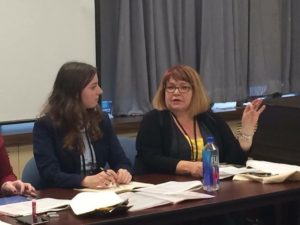
Pearl Sawyer, pictured on right, speaking at the U.N. Commission on the Status of Women parellel event sponsored by the Scottish Women’s Convention in New York City.
On March 17, Pearl Sawyer, executive vice president of UFCW Canada Local 1006A, served as the keynote speaker at a U.N. Commission on the Status of Women parallel event sponsored by the Scottish Women’s Convention in New York City. Sawyer presented a paper on behalf of UNI Global Union and UNI Equal Opportunities on the digitalization of work and the effect on gender.
One of the key findings presented was that 47 percent of current jobs being performed across the globe are amenable to being potentially computerized. The types of jobs that will be affected by digitalization will have a direct impact on positions held by women.
The effects of this will require workers to invest in further training and lifelong learning. Unfortunately, this can pose a challenge for women as they can neither afford it due social, cultural and economic barriers, or they cannot fit this need with their family duties and their need to work.
Digitalization of work will also lead to a widening of the technology gap. However, a study from the World Bank predicts that if we double the pace at which women become frequent users of digital technologies, the workplace could reach gender equality by 2040 in developed nations, and by 2060 in developing nations.
After outlining the effects of digitalization on work and gender, Sawyer then addressed the need for solutions: “So what can we do? At UNI Equal Opportunities, we want to be prepared for what lies ahead. We know that it is a daunting, and sometimes frightening scenario, but if we are ready, this challenge can become an excellent opportunity to grow and learn. And to be ready, we need a strategy, a plan. We need to be resourceful, we need to be prepared.”
With the right skills and education, people, particularly women, can use technology to create and capture value. Creative, problem-solving, and social skills will be key skills in the 21st century, especially in those areas where computers are still challenged to match human proficiency.
March 6, 2017
RWDSU Supports On-Call Scheduling Ban Legislation
On March 3, RWDSU President Stuart Appelbaum spoke at a rally in front of New York City Hall in support of Intro. 1387, legislation that will ban on-call scheduling practices in the retail industry. On-call scheduling disrupts workers’ lives by requiring them to be available to work certain hours even if they are not scheduled to work and won’t get paid. Appelbaum also testified at the New York City Council’s hearing in support of the ban.
“On-call scheduling is a pervasive and exploitive employment practice where workers do not find out until just before a scheduled shift if they will be required to work or not,” Appelbaum said. “On-call scheduling is devastating for retail workers. You need to put your life on hold and be available for work – regardless of whether you will be called-in or paid. If you are a part-time worker, the uncertainty of your schedule means you can’t arrange for a needed second job. If you are a parent, you don’t know if you are going to need child care. If you want to continue your schooling, you can’t sign up for classes without knowing your availability.”
“Today’s hearings are a critical first step in helping workers gain more control over their own lives and their ability to earn a living,” Appelbaum added. “I urge the city council to pass Intro. 1387 swiftly.”

